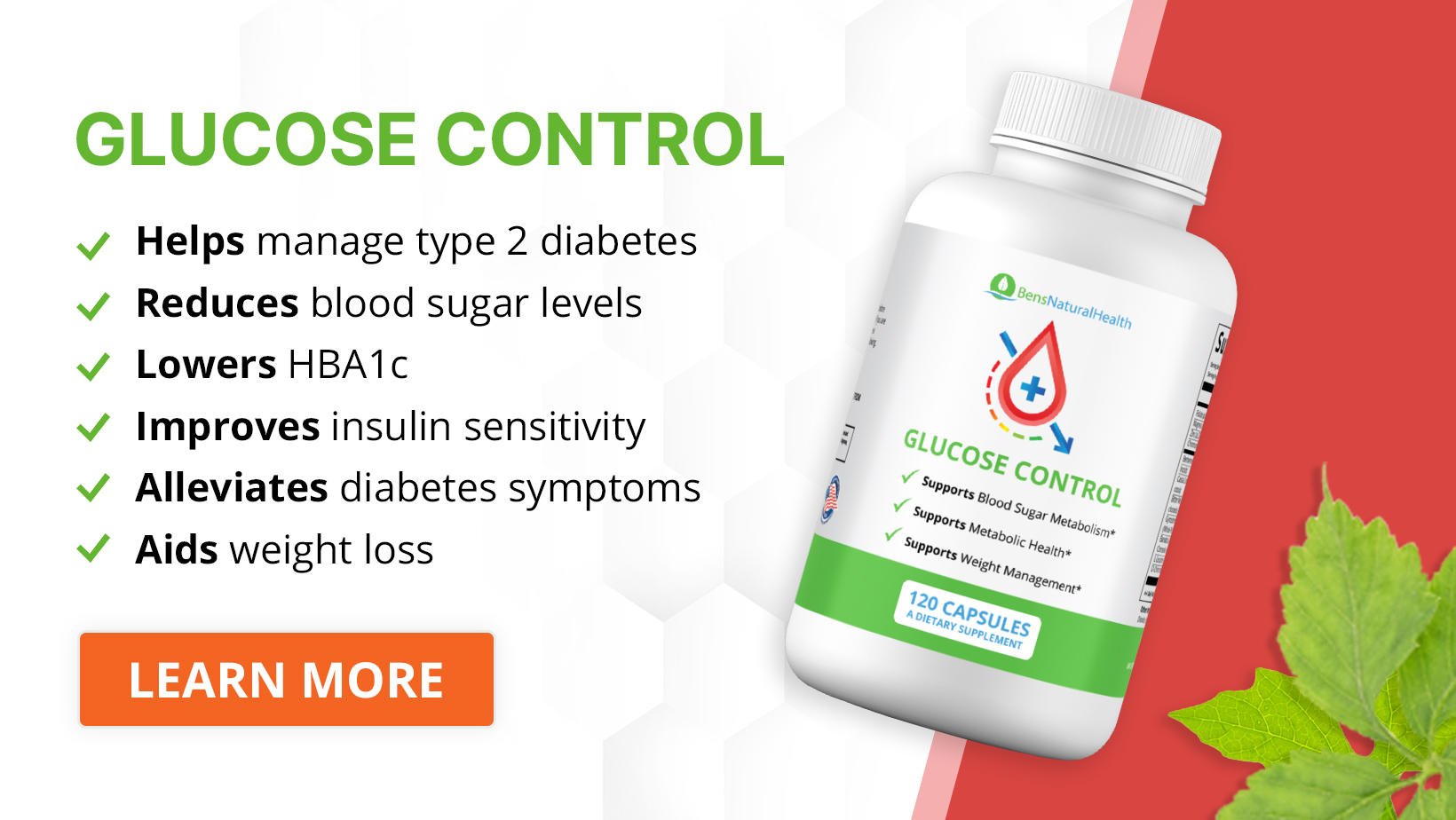- Foods to avoid while taking metformin
- Foods to avoid when taking metformin for PCOS
- What foods have natural metformin?
- Other foods to include in your metformin diet
- Other things to avoid while taking metformin
- Should metformin be taken with food?
- Should you take metformin before or after your meals?
- Any other safety concerns?
- A word from Ben’s Natural Health
- Ben’s Type 2 Diabetes Supplement: Glucose Control
- Ben’s Best-Selling Book: How To Reverse Type 2 Diabetes
- Conclusion
- Source
Did you know that medications can interact with the food you eat?
Metformin is no exception. If you are taking metformin, you may want to adjust your diet accordingly.
Read on to find out why and learn what foods have natural metformin and what foods you should avoid when taking metformin.
Foods to avoid while taking metformin
Below are six foods you to avoid while taking metformin.
1. Fats
You should avoid foods high in trans and saturated fats when taking metformin. Healthy fats, on the other hand, are fine and you should include them as part of a healthy diet if you’re on metformin.
2. Sodium
You should avoid having too much sodium while you’re on metformin. Keep your sodium intake under 2300 milligrams per day.
3. Simple and refined carbs
Simple and refined carbs increase your blood sugar levels. Avoid simple carbs such as soda, candy, and desserts. Stay away from refined carbs such as white bread, pasta, and white rice.
4. High-fiber foods
Fiber can absorb certain drugs and lower their concentration in your bloodstream. If you eat large amounts of fiber, your metformin levels may decrease. Keep your fiber intake under 30 grams per day.
5. Alcohol
You’ll want to avoid large amounts of alcohol since it increases your risk of developing low blood sugar and lactic acidosis. Alcohol prevents the liver from storing and releasing glucose.
Since people with diabetes already struggle to manage blood sugar levels, minimizing the risk factor of alcohol consumption is worth consideration.
Drinking alcohol with an empty stomach can cause low blood sugar. This is even more true for people taking insulin or other diabetes medications that increase insulin levels.
Metformin increases the amount of lactate. Lactate is the underlying compound of lactic acid.
This isn’t of too much concern, but research shows that too much alcohol, along with a thiamine deficiency, can lead to a buildup of lactate.
Alcohol and metformin together can lead to too much lactic acid in the blood. This can lead to lactic acidosis, a serious condition.
In general, drinking in moderation is safe. Safe levels are one drink per day for women and two drinks per day for men.
Discuss this with your doctor, as it’s possible that abstaining from alcohol may be the best choice for you as an individual.
6. Grapefruit
One study looked at the effects of grapefruit on metformin in rats. Some rats were exposed to grapefruit juice and metformin, while the others were given metformin on its own.
Researchers found that the rats that had both grapefruit juice and metformin had a higher amount of lactic acid production than the just metformin group. They may also have more weight gain.
Researchers postulated that grapefruit juice increased the accumulation of metformin in the liver. This then caused an increase in lactic acid production.
Researchers concluded that drinking grapefruit juice might lead to a higher risk of lactic acidosis in patients taking metformin.
Foods to avoid when taking metformin for PCOS
If you’re taking metformin for PCOS, you may need to adjust your diet. Below we share five foods to avoid when taking metformin for PCOS.
- Sugary drinks: Sugary drinks like soda, sweetened teas, flavored coffee drinks, and energy drinks are very high in added sugar, which can raise your blood sugar levels quickly. Since PCOS often stems from insulin resistance, it’s best to avoid sugary drinks so metformin can more easily do its job to help improve insulin sensitivity.
- Alcohol: Drinking alcohol can lower your blood sugar levels. If you drink a lot of alcohol while taking metformin for PCOS, you might develop even lower blood sugar levels. If you choose to drink alcohol while taking metformin for PCOS, try to limit it to no more than one drink per day.
- Foods with added sugar: Food high in added sugar can worsen insulin resistance and PCOS symptoms. The American Heart Association recommends limiting your added sugar consumption to fewer than 25 grams per day.
- Refined grains: Refined grains are stripped of their nutrient- and fiber-rich parts, leaving behind a lower-fiber, lower-nutrient grain. These types of grains are more likely to raise your blood sugar levels and worsen insulin resistance.
- Fried foods: If you experience stomach side effects while taking metformin for PCOS, try cutting back on fried foods to see if that’s part of the culprit. Cutting back on fried foods might also help you lose weight, which can improve insulin sensitivity and PCOS symptoms.

What foods have natural metformin?
Metformin is a biguanide medication. Biguanides help lower blood sugar levels by reducing how much sugar is released from your liver.
According to a study, some foods have “biguanide and related compounds (BRCs)” in them. That means that these foods have compounds similar to the active ingredient in metformin, but it doesn’t mean that they contain the actual drug metformin.
According to that study, some of the foods that contain biguanide and similar compounds include:
- Dried fenugreek seeds
- Fresh green curry leaves
- Fresh green bitter gourd
- Garlic
- Orange-fleshed sweet potato
- White-fleshed potatoes
You might have noticed that some of these foods (like potatoes) contain carbohydrates, which turn into blood glucose when they’re digested.
The natural metformin content of these foods might be outweighed by their carbohydrate content in some cases, which is why you shouldn’t replace prescribed metformin with them since the amount is much lower than in the actual medication.
There are some studies on the potential of bitter gourd to improve blood sugar levels. According to one study, bitter gourd “increases insulin secretion of the pancreas, decreases intestinal glucose uptake, and increases uptake and utilization of glucose in peripheral tissues” – which all promotes lower blood sugar levels in people with diabetes.
A study on fenugreek found that it lowered fasting blood sugar, post-meal blood sugar, and hemoglobin A1c levels.
Finally, a review of studies suggests that garlic might reduce diabetes complications and help prevent the progression of diabetes.
Other foods to include in your metformin diet
Below are five foods you should eat while taking metformin.
1. Complex carbohydrates
Complex carbohydrates come from vegetables, fruits, and whole grains, such as brown rice and whole-grain bread.
These carbs have more fiber, which makes them more difficult for the body to metabolize. This then slows the release of glucose into the bloodstream.
If you are consuming complex carbs, keep an eye on your overall carb intake. This is important because carbohydrates do directly affect blood sugar levels.
2. Nonstarchy vegetables
Nonstarchy vegetables can help to slow your carb metabolism. Examples of nonstarchy vegetables include broccoli and leafy greens.
3. Healthy fats
You can get healthy fats from sources such as fish, nuts, and olive oil.
4. Moderate fiber intake
Although lots of fiber is not recommended, moderate fiber intake can actually be helpful. This is because fiber can help to control blood glucose levels.
An average intake of fiber is between 25 and 30 grams per day.
5. Lean protein
Encourage the consumption of lean proteins such as turkey, fish, and tofu.
Other things to avoid while taking metformin
Fortunately, there aren’t many serious metformin drug interactions. But using some drugs while on metformin can increase the risk of lactic acidosis.
If you take any of the following medications, let your healthcare provider know:
- Anticonvulsants, such as topiramate (Topamax) and zonisamide (Zonegran)
- Oral contraceptives
- Corticosteroids, such as prednisone
- Diuretics, such as acetazolamide
- Blood pressure medication, such as amlodipine (Norvasc)
- Antipsychotic drugs, such as chlorpromazine
Get Your FREE Diabetes Diet Plan
- 15 foods to naturally lower blood sugar levels
- 3 day sample meal plan
- Designed exclusively by our nutritionist
Should metformin be taken with food?
It is fine to take metformin on an empty stomach, but taking metformin with food is usually better tolerated and helps to reduce the stomach or bowel side effects that can occur.
Should you take metformin before or after your meals?
You might wonder whether you should take metformin before or after your meals. There are two types of metformin – regular and extended-release (XR).
Typically, the regular tablet is taken with your meal two to three times a day. People usually take the extended-release tablet once a day with their evening meal.
As discussed above, the best way to take metformin is with your meal or just after you’ve finished eating to minimize the gastrointestinal side effects.
Talk to your healthcare provider or pharmacist for guidance on how and when you should take your metformin tablets.
Any other safety concerns?
Metformin has been associated with lactic acidosis. Although this is a rare situation, it is potentially life-threatening and therefore worth mentioning here.
Less than ten out of every 10,000 people on metformin experience lactic acidosis. You are at higher risk if you have impaired liver or kidney function. You are also at higher risk of lactic acidosis if you have congestive heart failure.
If you have ever had an allergic reaction to a medicine, you must tell your doctor this. Any other allergies to foods, preservatives, animals, or dyes are worth mentioning as well.
In terms of metformin contraindications, this drug is contraindicated if you have diabetic ketoacidosis.
Other potential side effects of metformin include the following:
- Nausea
- Vomiting
- Abdominal pain
- Gas

A word from Ben’s Natural Health
At Ben’s Natural Health, we believe that natural options are the way to go. Given the above side effects of metformin, many people prefer natural alternatives such as herbs and supplements, which can treat type 2 diabetes without side effects.
Talk to your healthcare provider about natural diabetes treatments to see which ones may be suitable for you.
Ben’s Type 2 Diabetes Supplement: Glucose Control
Glucose Control, a natural supplement for type 2 diabetes, contains clinically proven, natural ingredients to help stabilize and maintain an optimal blood sugar level.
Clinically formulated, Glucose Control works to regenerate your pancreas, aid weight loss, alleviate diabetic symptoms, and prevent the progression of diabetes.

Each ingredient has been thoroughly researched and scientifically proven to improve and maintain type 2 diabetes health.
Ben’s Best-Selling Book: How To Reverse Type 2 Diabetes
Our best-selling book, How To Reverse Type 2 Diabetes, combines scientific research and modern medicine with holistic healing.
The book lays out an easy step-by-step method to lower your HBA1c levels, restore insulin health, and reverse type 2 diabetes, in less than 90 days without using drugs or side effects!

How To Reverse Type 2 Diabetes contains complete diabetes diet and exercise plans. This, therefore, makes it the definitive guide to reversing type 2 diabetes and achieving type 2 diabetes remission.
Conclusion
If you’re taking metformin, foods to avoid include high fiber foods, trans and saturated fats, sodium, and simple and refined carbs. Get most of your carbs from vegetables, fruits, and whole grains.
Eat nonstarchy vegetables, healthy high fat foods, lean proteins, and a moderate amount of fiber. If you’re taking metformin, it’s worth talking with your health care provider about a metformin diet.
Explore More

5 Natural Alternatives to Metformin for Diabetes & Insulin Resistance.







